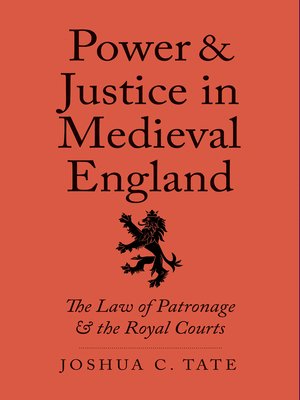Power and Justice in Medieval England
ebook ∣ The Law of Patronage and the Royal Courts · Yale Law Library Series in Legal History and Reference
By Joshua C. Tate

Sign up to save your library
With an OverDrive account, you can save your favorite libraries for at-a-glance information about availability. Find out more about OverDrive accounts.
Find this title in Libby, the library reading app by OverDrive.



Search for a digital library with this title
Title found at these libraries:
| Library Name | Distance |
|---|---|
| Loading... |
How the medieval right to appoint a parson helped give birth to English common law
Appointing a parson to the local church following a vacancy—an “advowson”—was one of the most important rights in medieval England. The king, the monasteries, and local landowners all wanted to control advowsons because they meant political, social, and economic influence. The question of law turned on who had the superior legal claim to the vacancy—which was a type of property—at the time the position needed to be filled.
In tracing how these conflicts were resolved, Joshua C. Tate takes a sharply different view from that of historians who focus only on questions of land ownership, and he shows that the English needed new legal contours to address the questions of ownership and possession that arose from these disputes. Tate argues that the innovations made necessary by advowson law helped give birth to modern common law and common law courts.
Appointing a parson to the local church following a vacancy—an “advowson”—was one of the most important rights in medieval England. The king, the monasteries, and local landowners all wanted to control advowsons because they meant political, social, and economic influence. The question of law turned on who had the superior legal claim to the vacancy—which was a type of property—at the time the position needed to be filled.
In tracing how these conflicts were resolved, Joshua C. Tate takes a sharply different view from that of historians who focus only on questions of land ownership, and he shows that the English needed new legal contours to address the questions of ownership and possession that arose from these disputes. Tate argues that the innovations made necessary by advowson law helped give birth to modern common law and common law courts.







